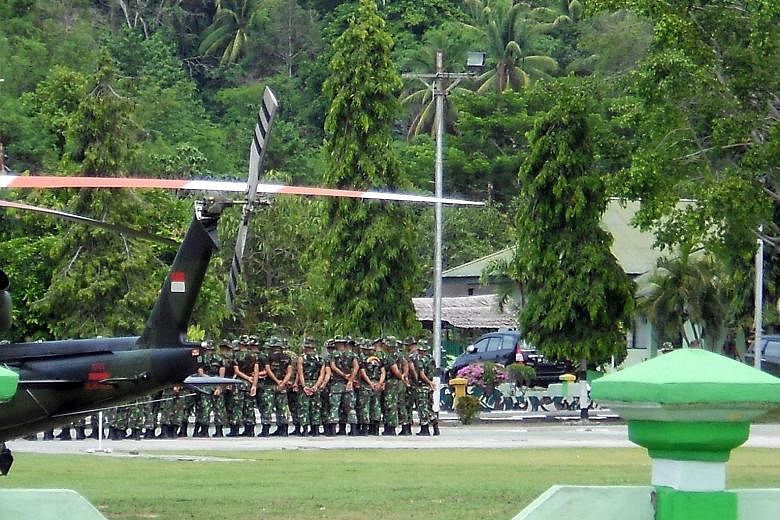President Joko Widodo's recent call for the military to have a bigger role in Indonesia's war on terror has been greeted with support from many lawmakers, but also trepidation by rights groups.
Certain members of the national police commission (Kompolnas) have even warned that giving the armed forces, or Tentara Nasional Indonesia (TNI), more powers in domestic counter-terrorism may be unconstitutional and lead to abuses. "If this law is ignored, it will affect the criminal justice system in Indonesia, disrupt the order of civil society, and perpetuate human rights violations," said Kompolnas commissioner chief Poengky Indarti.
But coming after the twin suicide bombings in East Jakarta that killed three policemen on May 23, and amid fears of a spillover from the fighting in Marawi city in southern Philippines, the call makes sense.
The TNI has more than 475,000 active front-line troops and about 400,000 in its reserve force. The police force, which spearheads counter-terrorism efforts, is about 425,000 strong, so tapping the TNI would mean having more boots on the ground, say analysts.
This is also aligned with the government's proposals to review the Anti-Terrorism Bill of 2003, deliberations of which have been dragging on in Parliament since last year. One of the key changes, lawmakers and security officials told The Straits Times last week, is to rope in TNI troops to ease the counter-terrorism burden now borne by Densus 88, the police anti-terror unit.
Mr Akbar Faizal, who sits on the parliamentary committee reviewing the Bill, said the amendments would allow the TNI to act on terror threats against foreign embassies, special economic zones, commercial vessels and aircraft, as well as terror cells in jungles or mountainous areas in Indonesia. Such a move should not be taken as a slight to the police, who have been effective in their counter-terrorism efforts since the 2002 Bali bombings, which claimed 202 lives. Last year alone, Densus 88 foiled no fewer than 15 terror plots, including one against Singapore. TNI has also contributed to that solid track record, having ended the manhunt for militant leader Santoso in the jungles of Poso, Central Sulawesi, last July.
Santoso, Indonesia's most wanted terrorist, had evaded the police for months until soldiers killed him in a gunfight. This helped strengthen the case for the military to play a greater counter-terrorism role at home. Citing the Poso operation, the director of human rights group Imparsial, Mr Al Araf, questioned the need to amend the laws when TNI troops already help fight terror. Indeed the TNI has often been mobilised, though in a supporting role, when the terror threat is raised.

Having soldiers supplement the police in homeland security has become a common practice in many other countries after the Sept 11, 2001 attacks.
The amendments were first tabled soon after Indonesian militants loyal to the Islamic State in Iraq and Syria mounted a brazen suicide attack in Jakarta on Jan 14 last year. This led lawmakers to lobby for the TNI to play a wider role beyond national defence.
House Speaker Setya Novanto confirmed last week that Parliament will speed up deliberations on the revisions, which initially revolve around laws to enhance police powers to detain terror suspects longer to facilitate investigations.
However, the impetus to give the TNI more teeth in internal security has raised concerns among some political observers and human rights activists who still remember the military's role in the repressive regime of former president Suharto.
During Suharto's New Order era from 1965 to 1998, the military - then known as Angkatan Bersenjata Republik Indonesia (Abri) - was a key player not just in national defence and internal security but also in socio-political affairs and national development. But sweeping reforms after the fall of Suharto saw Abri renamed the TNI and restricted by law to external defence, in part, to prevent human rights violations by rogue soldiers.
Constitutional law expert Jimly Asshiddiqie said while current laws prevent TNI from being involved in "non-defence" operations, there are exceptions and one was in domestic counter-terrorism. "Based on current laws, the TNI can, in certain conditions, take on such roles (but) it cannot be involved in these roles unless it is based on requests (by the State)," he told Kompas news.
National Human Rights Commission chief Nur Kholis agrees, but said the TNI should be called on for domestic operations as a last resort. "While it is part of the TNI's primary duties to carry out military operations other than war, it must only do so if it is a political decision made by the State."


